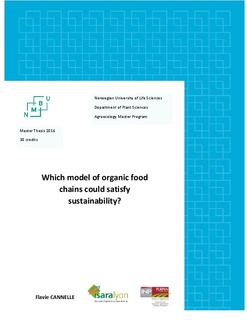Which model of organic food chains could satisfy sustainability?
Master thesis
Permanent lenke
http://hdl.handle.net/11250/2384028Utgivelsesdato
2016-04-05Metadata
Vis full innførselSamlinger
- Master's theses (IPV) [240]
Sammendrag
During the second half of the last century, organic agriculture and consumption increased tremendously. Organic distribution developed first through alternative food networks connecting mostly farmers directly with consumers while today most of organic purchases are done in conventional supermarkets. These globalised food stores don’t fit with the spirit of organic food production and sustainability whereas alternative food networks struggle to embrace all types of consumers. This study aims at giving concrete tools to convert or set up food chains turned towards sustainability and stakeholder satisfaction. The research is based on practical work and participatory observation with Pronatura, a French organic fruit and vegetables retailer, leader on the European market. I collected data through interviews with professionals in the company and observations in the field. The experience of setting up a subsidiary firm in Spain has been useful to be confronted with the reality of the sector. The analysis of documents and surveys of the company completed the data collection. The results show how different tools may be strengthening the sustainability of the food chain such as production planning, platform decentralization, farming contracts, diversified small-scale suppliers and spaces for stakeholders to meet; give feedback and take decisions. These tools impact directly our indicators of sustainability which are: economic profitability, transparency, information flow, power balance, trust and environmental sustainability. This work confirms the possibility of building sustainable food chains satisfying all the stakeholders involved.
